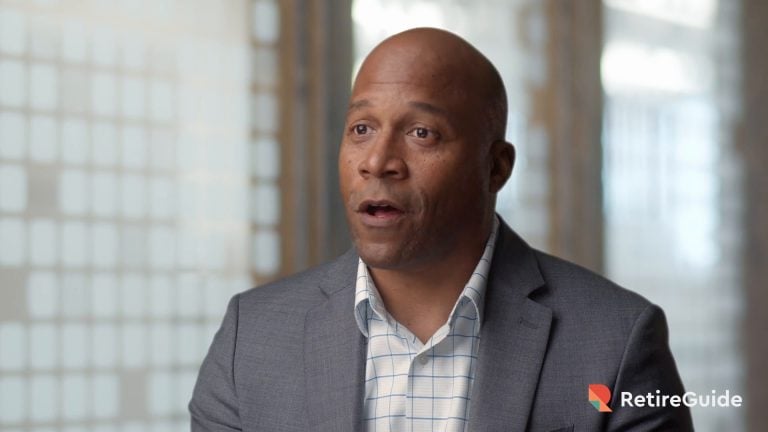2025 Medicare Costs and Coverage
Medicare Part A, which covers inpatient care and hospital stays, is premium-free for most beneficiaries. Part B, which covers outpatient care and other services, has a monthly premium of $185 in 2025. Medicare Advantage and Part D prescription drug plans often come with added premiums in exchange for more coverage.

- Written by Christian Simmons
Christian Simmons
Financial Writer
Christian Simmons is a writer for RetireGuide and a member of the Association for Financial Counseling & Planning Education (AFCPE®). He covers Medicare and important retirement topics. Christian is a former winner of a Florida Society of News Editors journalism contest and has written professionally since 2016.
Read More- Edited By
Savannah Pittle
Savannah Pittle
Senior Financial Editor
Savannah Pittle is a professional writer and content editor with over 16 years of professional experience across multiple industries. She has ghostwritten for entrepreneurs and industry leaders and been published in mediums such as The Huffington Post, Southern Living and Interior Appeal Magazine.
Read More- Reviewed By
Aflak Chowdhury
Aflak Chowdhury
Medicare Expert
Aflak Chowdhury is a Medicare expert and independent insurance broker specializing in group health insurance. He has worked for major providers including Humana and Principal Financial Group and today works mainly in the small group market.
Read More- Published: April 28, 2020
- Updated: May 1, 2025
- 9 min read time
- This page features 7 Cited Research Articles
Key Takeaways- Original Medicare covers everything from inpatient hospital stays and home health care to doctor’s visits, medical equipment and preventive care. Something that is considered medically necessary is typically covered.
- Part A is premium-free for most Medicare beneficiaries as long as they worked and paid Medicare taxes over a certain period.
- Medicare Advantage and Part D prescription drug coverage, both of which are sold through private insurers, do not have a set price or coverage since it varies from plan to plan.
How Much Does Medicare Cost?
While Medicare provides federally administered health insurance to millions of older Americans, you may face several out-of-pocket costs. However, other plans and options are available to help you meet those expenses.
There are four parts to Medicare — Parts A through D — as well as supplemental insurance, called Medigap, which affect your out-of-pocket costs.
Important Medicare Cost Definitions- Premium
- This is the monthly payment you make for Medicare coverage.
- Deductible
- You must pay a certain amount for medical care before Medicare kicks in. This varies for Medicare Parts A through D. This amount is called your deductible. It resets each year.
- Coinsurance
- This is usually measured as a percentage of your doctor, hospital or other medical bill. Coinsurance is a cost you may have to pay for your share of medical services even after you’ve paid your deductibles.
- Lifetime Reserve Days
- Medicare pays for only 90 days of hospitalization but gives you an extra 60 “lifetime reserve days” for your entire lifetime. These are additional days Medicare pays for hospitalization if you need more than 90 days in the hospital. If you use all these up, you will have to pay out of pocket for hospitalization.
What Does Medicare Cover?
Original Medicare, which is made up of Parts A and B, covers inpatient care and hospital stays as well as doctor visits, treatments, services and outpatient care.
Medicare typically covers things that fall under the umbrella of medically necessary care. This means that services such as cosmetic surgery and nonmedical procedures are rarely covered.
What Medicare Covers- Inpatient care
- Hospice care
- Medical equipment
- Doctor visits
- Lab tests
- Telehealth
- Mental health services
Some areas are exempted from Original Medicare coverage. These include dental care, vision care and prescription drug coverage. These areas can be covered through private plans such as Medicare Advantage.
Terry Turner | 0:42 What do Medicare Part A and Medicare Part B cover? Have you selected your 2025 Medicare plan?Replay VideoTerry Turner, senior financial writer and financial wellness facilitator, explains the difference between Medicare Part A and Medicare Part B.
Have you selected your 2025 Medicare plan?Replay VideoTerry Turner, senior financial writer and financial wellness facilitator, explains the difference between Medicare Part A and Medicare Part B.Medicare Part A Costs and Coverage
Medicare Part A is hospital insurance. It covers inpatient hospital stays, skilled nursing facility care and hospice care. Long-term care is not covered under Part A.
If you receive Social Security for at least four months before your 65th birthday, you will be automatically enrolled in Part A and Part B. If you don’t receive Social Security before turning 65, you’ll need to sign up with Social Security to receive coverage.
What Medicare Part A Covers- Inpatient care
- Hospice care
- Home health care
- Skilled nursing facility care
Part A charges no monthly premium to anyone who paid Medicare taxes through their employer for at least 10 years. Those who haven’t worked that long have to pay premiums for Part A coverage. Most beneficiaries do not have to pay the premium.
2025 Medicare Part A Out-of-Pocket Costs and IncreasesCharges 2025 Cost 2024 Cost Monthly premium for anyone who has worked 40 quarters (10 years) $0 $0 Monthly premium for anyone who has worked fewer than 30 quarters (7.5 years) $518 $505 Monthly premium for anyone who has worked 30 to 39 quarters (7.5 to 9.75 years) $285 $285 Hospital deductible $1,676 $1,632 Coinsurance per day for days 61 to 90 of hospitalization $419 $408 Coinsurance per day for hospital stays beyond 91 days (using lifetime reserve days) $838 $816 Coinsurance per day for skilled nursing facility stays (days 21-100) $209.50 $204 Have you selected your 2025 Medicare plan?Maximize your Medicare savings by connecting with a licensed insurance agent.Medicare Part B Costs and Coverage
Medicare Part B covers most doctor visits, outpatient care, preventive services and some medical supplies. You may face a late enrollment penalty if you don’t sign up for Part B when you first become eligible.
What Medicare Part B Covers- Doctor visits
- Lab tests
- Diagnostic screenings and preventative care
- Medical equipment
- Ambulance services
- Telehealth services
- Mental health
- Advance care planning
- A very limited number of outpatient prescription drugs.
The Part B deductible for 2025 is $257. After meeting your deductible, you are responsible for 20% of all costs under coinsurance.
Part B premiums are based on a progressive scale depending on how much income you have and whether you filed an individual or joint tax return.
2025 Medicare Part B Premium Based on IncomeIncome Level for Individual Taxpayer (2023) Income Level for Joint Tax Filers (2023) Monthly Medicare Part B Premium (2023) $106,000 or less $212,000 or less $185.70 $106,000 to $133,000 $212,000 to $266,000 $259.00 $133,000 to $167,000 $266,000 to $334,000 $370.00 $167,000 to $200,000 $334,000 to $400,000 $480.90 $200,000 to $500,000 $400,000 to $750,000 $591.90 $500,000 or more $750,000 or more $628.90 Will Howery, MBA | 0:55 What should people know about their Medicare out-of-pocket costs when shopping for a plan? Get Free Help Pricing and Building Your Medicare PlanReplay VideoWilliam Howery, a Medicare expert who has a decade of experience in the insurance industry, explains what you should know about the out-of-pocket costs of Medicare while shopping for a plan.
Get Free Help Pricing and Building Your Medicare PlanReplay VideoWilliam Howery, a Medicare expert who has a decade of experience in the insurance industry, explains what you should know about the out-of-pocket costs of Medicare while shopping for a plan.Medicare Advantage Plans Costs and Coverage
Medicare Advantage plans, is an all-in-one alternative to Original Medicare. These plans are administered by private insurance companies approved by the federal government.
Medicare Advantage bundled plans include Part A and Part B and usually have Part D drug coverage. Plans may also include other extra benefits such as vision and dental.
What Medicare Advantage Covers- All the services covered by Original Medicare.
- Vision, hearing and dental are usually included.
- Most plans offer some form of prescription drug coverage.
Since Medicare Advantage plans are provided through private insurers, there are no fixed premiums, deductibles or coinsurance. Instead, they vary from plan to plan. You first must have Original Medicare before you can buy a Medicare Advantage plan.
The companies that administer the plans decide what to charge for premiums, deductibles and coinsurance once a year. Medicare does not have a hand in determining the costs. Changes take effect on Jan. 1 of the following year.
Cost-Determining Factors of Medicare Advantage Plans- Whether your Part B premium is included in the Advantage plan. Some Medicare Advantage plans cover all or part of your Part B premium.
- Whether you have Medicaid or other state assistance.
- Whether the plan charges for extra benefits you need.
- Whether the plan charges a premium since some plans do not.
- The type of Medicare Advantage plan you have and whether a doctor or other health care provider accepts it.
- The type of health services you use.
- The annual limit your plan sets for out-of-pocket costs for health care.
- The amount of your coinsurance or copay, which can differ from Medicare Part B.
- The amount of the Medicare Advantage plan deductible or whether it even has a deductible.
- How often you use health services.
- Added costs of seeing a health care provider outside your plan’s network.
3 Minute Quiz: Can You Retire Comfortably?Take our free quiz & match with a financial advisor in 3 easy steps. Tailored to your goals. Near you or online.Medicare Part D Costs and Coverage
Medicare Part D, which is provided through private insurers like Medicare Advantage, covers prescription drugs. All Part D drug plans must provide a minimum coverage level set by Medicare. However, the type of drugs covered depends on the formulary, which is a list of prescription drugs covered. Formularies vary from plan to plan.
Formularies are broken into tiers. Each tier has a different cost-sharing amount. For example, Tier I drugs may include low-cost generic medications while Tier III drugs may include non-preferred name-brand medications. Part D coverage is often included in Medicare Advantage plans.
The cost of a Part D plan varies depending on cost and which drugs it covers. If you live in a high-income household, you may have to pay an extra cost to your standard Part D premium due to the income-related monthly adjustment amount.
If you do not sign up for Part D coverage when you first enroll in Medicare, you can sign up later. However, you will pay an ever-increasing penalty unless you have other creditable prescription drug coverage or you receive certain other assistance from the state or federal government.
The penalty, which applies if you don’t have some form of drug coverage 63 days after your initial Medicare enrollment period ends, is based on how long you waited to enroll in a prescription drug plan. It adds a cost for each month you went without enrolling on to all future monthly premium payments.
John Clark, CLTC®, NSSA® | 0:44 Why is it so difficult to select a Medicare drug plan? Have you selected your 2025 Medicare plan?Replay VideoJohn Clark, licensed insurance advisor and owner of Senior Solutions Insurance Agency, discusses why it is important to work with a professional when selecting a Medicare Part D drug plan.
Have you selected your 2025 Medicare plan?Replay VideoJohn Clark, licensed insurance advisor and owner of Senior Solutions Insurance Agency, discusses why it is important to work with a professional when selecting a Medicare Part D drug plan.Medicare Supplement Insurance Costs and Coverage
If you’re enrolled in Original Medicare, enrolling in Medicare supplemental insurance — also known as Medigap — may help cover additional costs such as copayments and deductibles.
Companies are free to set their own prices for each plan they offer, but the rates are filed and reviewed by the various state insurance departments.
According to the U.S. Centers for Medicare and Medicaid Services, the cost of your Medigap policy can be priced in three different ways – no age-rated, entry age-rated or attained-age-rated.
Medigap Policy Premium Pricing Rules- No Age-Rated
- The same monthly premium is charged to everyone, regardless of age. For example, a 65-year-old and 72-year-old may pay the same $165 premium.
- Issue-Age Rated
- Your premiums are set based on your age when you purchase the policy. Age won’t change your premium cost. For example, a 65-year-old could buy a Medigap policy for $145 a month. A 72-year-old could buy the same Medigap policy, but their premium would be $175.
- Attained Age-Rated
- The premium is first based on your current age but then increases as you age. You may purchase a policy at age 65 for $120, but your premium will increase each year.
The premium is first based on your current age but then increases as you age. You may purchase a policy at age 65 for $120, but your premium will increase each year.
Different insurers may charge different premiums for the exact same plan, so it’s important to compare prices between companies to find the best deal.
Medicare Costs & Coverage FAQs
Is Medicare free after the age of 65?No, you will have to pay out-of-pocket costs that can include Medicare premiums for different parts of Medicare, along with deductibles and coinsurance for all parts. Medicare also doesn’t cover everything, so you’ll need to plan for additional expenses.How much does Medicare usually cost per month?You will pay $185 for Medicare Part B premiums in 2025 — more if you have a higher income. Most people don’t have to pay Part A premiums. Premiums for Medicare Advantage plans, Part D prescription drug plans and Medigap plans vary.Does Medicare cost more than regular insurance?Medicare usually costs less than private insurance. But if your employer pays part of your premiums through your health insurance at work, it may offset the price and be cheaper.Never Miss Important News or Updates with Our Weekly NewsletterGet money-saving tips, hard-to-find info and tactics for a successful retirement in our free weekly newsletter.Editor Hannah Alberstadt contributed to this article.
Last Modified: May 1, 2025Share This Page7 Cited Research Articles
- U.S. Centers for Medicare & Medicaid Services. (2024, December). 2025 Medicare Costs. Retrieved from https://www.medicare.gov/Pubs/pdf/11579-medicare-costs.pdf
- Centers for U.S. Medicare & Medicaid Services. (2024, November 8). 2025 Medicare Parts A & B Premiums and Deductibles. Retrieved from https://www.cms.gov/newsroom/fact-sheets/2025-medicare-parts-b-premiums-and-deductibles
- U.S. Centers for Medicare & Medicaid Services. (2024). Choosing a Medigap Policy: A Guide to Health Insurance for People with Medicare. Retrieved from https://www.medicare.gov/publications/02110-medigap-guide-health-insurance.pdf
- Centers for U.S. Medicare & Medicaid Services. (2023, October 12). 2024 Medicare Parts A & B Premiums and Deductibles. Retrieved from https://www.cms.gov/newsroom/fact-sheets/2024-medicare-parts-b-premiums-and-deductibles
- U.S. Centers for Medicare & Medicaid Services. (2019, November 8). 2020 Medicare Parts A and B Premiums and Deductibles. Retrieved from https://www.cms.gov/newsroom/fact-sheets/2020-medicare-parts-b-premiums-and-deductibles
- U.S. Centers for Medicare & Medicaid Services. (n.d.). Costs. Retrieved from https://www.medicare.gov/basics/costs/medicare-costs
- U.S. Centers for Medicare & Medicaid Services. (n.d.). How to Get Prescription Drug Coverage. Retrieved from https://edit.medicare.gov/drug-coverage-part-d/how-to-get-prescription-drug-coverage
- Edited By
Calling this number connects you to one of our trusted partners.
If you're interested in help navigating your options, a representative will provide you with a free, no-obligation consultation.
Our partners are committed to excellent customer service. They can match you with a qualified professional for your unique objectives.
We/Our Partners do not offer every plan available in your area. Any information provided is limited to those plans offered in your area. Please contact Medicare.gov or 1-800-MEDICARE to get information on all of your options.
866-749-5443Your web browser is no longer supported by Microsoft. Update your browser for more security, speed and compatibility.
If you need help pricing and building your medicare plan, call us at 844-572-0696


